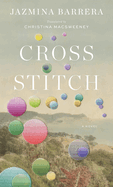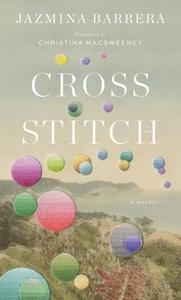
 In Cross-Stitch, the inventive first novel by Mexican author Jazmina Barrera (On Lighthouses), a sudden death provokes an intricate examination of three young women's years of shifting friendship. Their shared hobby of embroidery occasions a history of women's handiwork, woven into a relationship study that may remind readers of works by Elena Ferrante and Deborah Levy.
In Cross-Stitch, the inventive first novel by Mexican author Jazmina Barrera (On Lighthouses), a sudden death provokes an intricate examination of three young women's years of shifting friendship. Their shared hobby of embroidery occasions a history of women's handiwork, woven into a relationship study that may remind readers of works by Elena Ferrante and Deborah Levy.
Mila, a Mexico City writer with a young daughter, is blindsided by the news that her friend Citlali has drowned in Senegal. Citlali, who worked for an environmental NGO, struggled with mental illness. New antidepressants slowed her reaction times when she went swimming, so whether her death was accidental or a suicide is unclear.
Mila, Citlali, and Dalia had been best friends since middle school. While waiting to be reunited with Dalia for Citlali's memorial service, Mila browses a journal she kept during their travels in Europe and to a Mexican village to remember key moments from their friendship. They all volunteered one summer in high school, for an adult literacy campaign in Yospí. Later, at age 19, Dalia and Mila visited Citlali, who had moved to France instead of attending college. Before meeting Citlali in Paris, the pair packed in lots of London sightseeing.
Although they give the appearance of being chosen at random, it's clear that Mila has carefully curated the scenes to reveal the friends' dynamic over time. They all had romantic vicissitudes and drifted apart in adulthood. Citlali's troubles included an eating disorder and her father's abusive tendencies. Dalia moved to Spain and has a nonbinary partner. Mila, the only one with a child, struggles to balance her career with motherhood.
Like a scrapbook or commonplace book, the novel--elegantly translated from the Spanish by Christina MacSweeney--pieces together Mila's memories with references to the history of the textile arts. A repeated icon of a threaded needle separates the fragments. Barrera builds a rich collage of vignettes about art, etymology, and legends that illuminate the womanly traditions of handicraft. Cross-stitch becomes its own metaphorical language, passed on by female ancestors and shared across social classes. It is also the basis for the enduring bond between the three main characters: after Citlali's death, Dalia and Mila vow to complete their friend's spider-motif embroidery project.
A feminist, intertextual gem reminiscent of Still Born and A Ghost in the Throat, Cross-Stitch considers friendship and grief alongside women's work, musing on its serious themes with nimble grace. --Rebecca Foster, freelance reviewer, proofreader, and blogger at Bookish Beck
Shelf Talker: Jazmina Barrera's first novel is an intricate portrait of the friendship among three Mexican women over time, with themes of bereavement, environmentalism, and handicraft.

